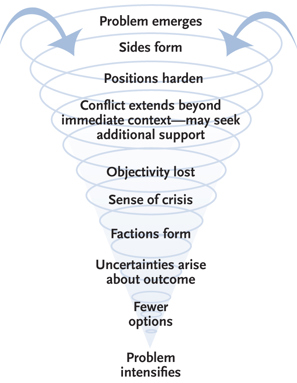At some point, people where you work may have problems getting along. It is important to recognize conflict and deal with it in ways that make everyone feel listened to and supported.
Disagreements can be positive when they help us understand other people's points of view. But when conflicts are ignored, they can affect everyone negatively.
Why you should care
Every conflict has its costs. For you and your co-workers, the costs can be added stress, low morale, and damaged working relationships. For your employer, costs can include lower productivity, unhappy customers, and having to recruit new workers when people quit.
“Meeting jaw to jaw is better than war.”—Winston Churchill
By solving conflicts, you and your workplace can benefit:
- Workers and employers can feel a strong sense of fairness when everyone has a voice.
- Solving conflicts builds trust and can open creative discussions about much more than the conflict itself.
- Employees can be inspired to contribute more.
- Employees can achieve more as a high-functioning team, then they can as individuals.
It helps to view conflict as an opportunity to grow and learn. Without conflict, no new ideas can come forward. A workplace without employees coming up with competing ideas would quickly find themselves stuck in the past.
Types of conflicts
The possible causes for workplace disputes are almost limitless and can be about big issues or seemingly small ones. To name just a few, you could find yourself in a conflict over:
- Who is selected for a particular job, or who is fired or promoted
- Comments someone has made about another person's age, race, ancestry, culture, religious beliefs, or sexual orientation
- Sexual harassment
- Rumours started by you or another worker
- Your performance or someone else's
- Someone consistently arriving late or leaving early
- Someone eating other people's food in the company fridge
Often, the easiest thing to do is ignore a conflict and move on. At the other end of the spectrum, conflicts can sometimes lead to violence. Neither of these things is a good way to deal with conflict.
The case for early intervention
When people or groups have differences, one problem often leads to another. Supervisors and workers who used to get along have a falling out. Over time, people's positions harden, and negativity builds. You can get caught in a downward spiral.
Like a real twister, conflict spirals can do damage—in this case, to work relationships. The sooner you take action on a conflict, the more wind you will knock out of a conflict spiral.
What can you do?
Conflicts themselves are not the problem. The trouble is with how people sometimes deal with them. All workplaces should have some kind of dispute resolution system, or way to deal with conflicts, so that people can handle them in an effective way.
Sometimes, it can be effective to talk informally about a conflict. Maybe your co-workers or supervisors just need to become aware of an issue to see that your concerns are valid. But if a chat doesn't solve the issue—or, worse, it leads to a more serious conflict—you will need to use a formal method.
Issue-based problem solving is a proven method to deal with conflict in the workplace. It is not a quick fix, but it shows a new and detailed way of talking about how to solve conflicts.
Issue-based problem solving moves beyond the outdated idea of having winners and losers. Instead, it can make everyone—employees, employers, and those they serve—winners. Once you feel familiar with the process of issue-based problem-solving, you might find the technique useful in dealing with family disputes or in sorting out disagreements that arise within associations, religious groups, unions, or elsewhere in the wider community.
Sometimes a conflict can only be resolved by bringing in a neutral third-party to review the situation and provide their feedback. These facilitators have specialized training in resolving conflicts and can help find a resolution that satisfies both sides.
Conflicts are a normal part of any job. If you deal with them swiftly and in a positive way, conflicts can actually improve how things are done in your workplace.




